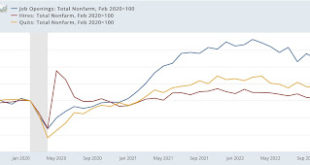January JOLTS report consistent with a softening, but still very strong, labor market – by New Deal democrat This morning’s JOLTS report for January, unlike the recent payrolls report, generally showed further softening in the labor market. While hires (red in the graph below, normed to a value of 100 as of February 2020) increased 121,000, quits (gold) declined 207,000, and openings (blue) declined 410,000: The downward trend in quits...
Read More »COVID-19: Inequality
By James Kwak By some measures, in the short term, COVID-19 will surely reduce inequality of wealth, and probably inequality of income as well. As a purely mechanical matter, the rich have a lot more money to lose when the stock market crashes and most sectors of the economy grind to a halt. Photo by Free-Photos from PixabayAt the same time, however, this pandemic is throwing into stark relief how unequal the lives of Americans are today. Most of the upper-middle class and rich seem to...
Read More »COVID-19: Inequality
By James Kwak By some measures, in the short term, COVID-19 will surely reduce inequality of wealth, and probably inequality of income as well. As a purely mechanical matter, the rich have a lot more money to lose when the stock market crashes and most sectors of the economy grind to a halt. Photo by Free-Photos from PixabayAt the same time, however, this pandemic is throwing into stark relief how unequal the lives of Americans are today. Most of the upper-middle class and rich seem to...
Read More »COVID-19: The Butcher, the Brewer, and the Baker
By James Kwak “It is not from the benevolence of the butcher, the brewer, or the baker that we expect our dinner, but from their regard to their own interest.” —Adam Smith, The Wealth of Nations Image by Mandy Fontana from PixabayThis is the most famous line from the most famous justification of market capitalism. Smith’s point is that it is individual self-interest that drives the economy. In the next paragraph, he goes on to describe how gains from trade explain the division of labor in...
Read More »COVID-19: The Butcher, the Brewer, and the Baker
By James Kwak “It is not from the benevolence of the butcher, the brewer, or the baker that we expect our dinner, but from their regard to their own interest.” —Adam Smith, The Wealth of Nations Image by Mandy Fontana from PixabayThis is the most famous line from the most famous justification of market capitalism. Smith’s point is that it is individual self-interest that drives the economy. In the next paragraph, he goes on to describe how gains from trade explain the division of labor in...
Read More »Principals of Macroeconomics 5: Robinson and the Theory of Capital — John Weeks
In Chapter 1 of The General Theory Keynes famously refers to two “postulates of Classical economics”, one of which determines the demand for labour and the other the supply. He states that “I shall argue that the postulates…are applicable to a special case only and not to the general case”, with continuous full employment the “special case” and less than full employment the general case. In the context of later parts of The General Theory (for example, Appendix on User Cost and Chapter 20...
Read More »Bill Mitchell — Of course governments will be fiscally stretched if they define large surpluses as the norm
Wednesday and a short blog post. I regularly work for unions as an expert analyst/witness in their struggles to achieve wage justice with employers who are intent on paying as little as possible. Often these are private employers but at the moment I am helping a union with their campaign to win a reasonable wage increase against a state government. The logic deployed by the government in relation to their fiscal affairs and their wage setting behaviour is a classic demonstration of how...
Read More »Kate Bahn — Understanding the importance of monopsony power in the U.S. labor market
With the launch of our new website, we are reintroducing visitors to our policy issue areas. Informed by the academic research we fund, these issue areas are critical to our mission of advancing evidence-based ideas that promote strong, stable, and broad-based economic growth. Through June and continuing in July, expert staff have been publishing posts on our Value Added blog about each of these issue areas, describing the work we do and the issues we seek to address. The following post is...
Read More »Bill Mitchell — US labour market tepid – there is plenty of scope fiscal expansion
On May 4, 2018, the US Bureau of Labor Statistics (BLS) released their latest labour market data – Employment Situation Summary – April 2018 – which showed that total non-farm employment from the payroll survey rose by just 164,000 in April, which was an improvement on the very modest rise in March. The Labour Force Survey data, however, showed that employment only rose by 3 thousand) in April 2018 but was accompanied by a substantial fall in the labour force (236 thousand) which meant that...
Read More »Brian Romanchuk — How I Would Analyse A Job Guarantee
The Job Guarantee proposal is a core part of the policy analysis of Modern Monetary Theory (MMT). If implemented, it would be expected to cause a structural change in the economic structure, and so analysis techniques that extrapolate current conditions would be inapplicable. Although this analysis is aimed at the Job Guarantee, the basic principles would be applicable for other measures that cause a structural change in the labour market, such as the Universal Basic Income. (In fact, it's...
Read More » Heterodox
Heterodox





